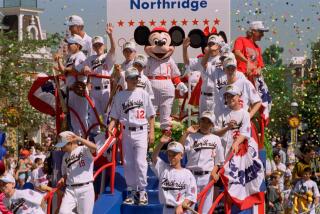Nostalgia for Child’s View of Nuclear World
- Share via
When the atom bomb was dropped, first on Hiroshima and then on Nagasaki, I was too young to be aware of it; and so last summer, when other people recalled where they were 40 years ago, what I remembered was September of 1952, Mr. Wells and the bells.
“No, Jenny,” Mr. Wells said. “It’s the other way around. Three bells for a fire drill. Four. Four bells for a bomb.
Bomb drills?
Mr. Wells repeated the San Diego City Schools new emergency drill procedures.
“Four bells for a bomb. Then go to your desks and stay there until I tell you to form a line at the door, single file and no talking. “
“From there,” Mr. Wells said, “We will go into the corridor. You will kneel down facing the wall. You will put your head down on your knees. You will clasp your hands over the back of your neck to protect your spinal cord from flying glass.”
“And you will stay there, without moving a muscle, until you hear the all clear alarm.”
“And then what will happen, Mr. Wells?”
“Your parents will come to get you.”
Is that all there is? Your parents will come to get you?
Big deal, the bomb. The Russians drop it and then your parents come to take you home.
The next year, in junior high school, I was too full of hope for the future to be concerned about a bomb. Today the seventh grade. Tomorrow a teen-ager. Tomorrow I would wear lipstick, saddle shoes and Angora sweater sets. Tomorrow I would shave my legs and go to parties with boys. Who had time to think of a bomb?
At Point Loma High School, I thought of it twice; once, when I read “On the Beach” and again when I sat weeping through the movie from the back row of the Loma Theatre. But I wept, not for the end of the world, but for beautiful Ava Gardner left standing on the beach, as Gregory Peck sailed past her and on out to sea.
I would not think of it when the class grind read “Hiroshima” and tried to tell me about it. I smugly dismissed the horrors John Hersey described. I had been taught that the United States fought for noble causes; fought for them fairly and honorably and so never, ever lost a war. I believed what I was taught. I believed it could not happen here.
I have learned some things since September of 1952 that I was not taught in school.
I know that people cannot continue to fight wars with each other and hope to survive. I know it is possible for it to happen here, for I know it is naive to believe that someone or something will prevent the final insanity. I know there are people who believe they can make a difference--the members of MEND and Beyond War believe they can effect change--but the older I get, the less I believe that is true.
For if I do not remember Hiroshima or Nagasaki, I do remember 20 years ago when I was cocksure and committed to a cause. When the limited land war in Vietnam appeared to be as great a threat then as nuclear holocaust does now, many people joined groups to lobby, write letters or take to the streets to change government policy and to end the war. Twenty years later I know our Balboa Park rallies and our marches along Broadway were useless. The war ended when they were good and ready to end it, and not one moment before.
I wish I could forget what I know now and could go back to 1952, to Mr. Wells and the bells.
I would like to be a sixth-grade student at Silvergate Elementary School who believes all that her teacher tells her is true. Then I would be a little girl with only one worry when the four bells begin to ring: Kneeling side by side with my classmates with my head down on my knees, before clasping my hands over the back of my neck I wonder if I tucked in my skirt all around in the back so my panties do not show.
Last summer I remembered that little girl. I wish I could be her again.
More to Read
Sign up for Essential California
The most important California stories and recommendations in your inbox every morning.
You may occasionally receive promotional content from the Los Angeles Times.













